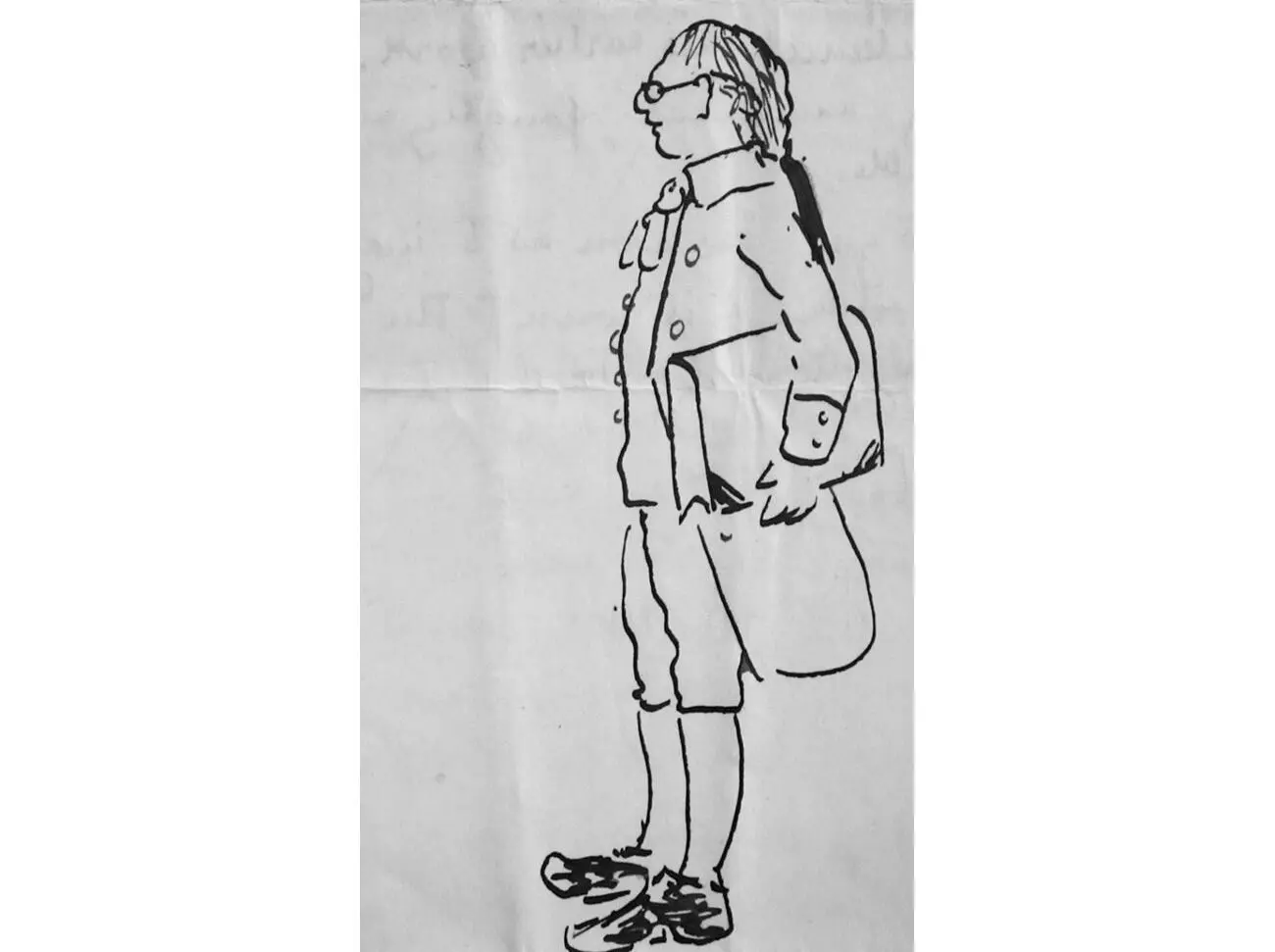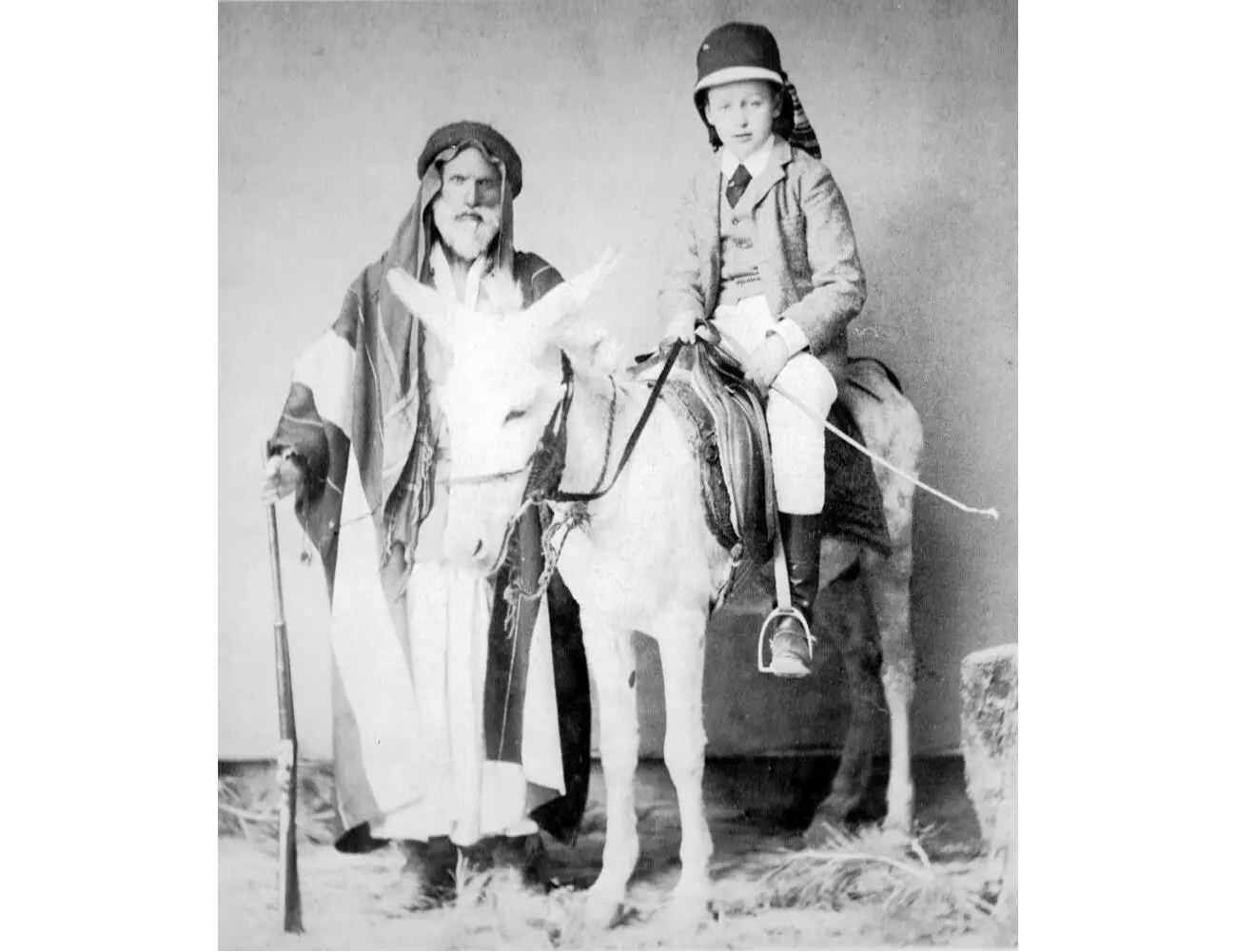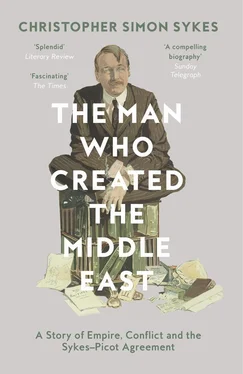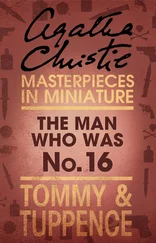Up till now, the elementary part of Mark’s education had taken place at Sledmere village school. Here he had learned to write and spell under the worthy schoolmaster, Mr Thelwell, but had shown little aptitude for other studies: ‘he was not a diligent scholar,’ commented Thelwell; ‘book-work was drudgery; but having great powers of observation and a splendid memory, he stored a mass of information’. 33Almost everything else he had learned, he had done so at his mother’s knee, so in 1887 Jessie gave in to her mother and hired a young tutor, Alfred Dowling, whom Mark nicknamed ‘Doolis’. No sooner had he arrived than his new charge had dragged him up to see the Library, which he said was the only ‘schoolroom’ he ever loved. ‘I wish you could see the library here,’ he was later to write to his fiancée, Edith Gorst, ‘it is really very interesting. Going into a library that has stopped in the year 1796 is like going back a hundred years. Everything is there of the time. In the drawers is the correspondence dated for that year. In the cupboards are the ledgers and rent rolls of the last century. If I stayed in it long I, too, would be of the last century, because everything there is of the same date, from fishing rods to the newspapers.’ 34

‘I enjoyed an advantage over most of my age,’ he was to write in a memoir, ‘in having access to the very large library at Sledmere, and, before I was twelve, I was quite familiar with the volumes of Punch and the Illustrated London News for many years back.’ 35He was particularly fascinated by military history, inspired no doubt by the large collection of old uniforms and muskets which lay about the house, a reminder of the days when his ancestor Sir Christopher Sykes had, in 1798, raised a troop of yeomanry to defend the Wolds against the French, and amongst his favourite books were Marshal Saxe’s Reveries on the Art of War and Vauban’s seventeenth-century treatise New Methods of Fortification . There were other rarer and more forbidden books too, such as Richard Burton’s translation of the Arabian Nights, the footnotes of which, with their anthropological observations on Arab sexual practices such as bestiality, sodomy, eunuchism, clitoridectomy and miscegenation, all contributed to his sexual education.
It was a bout of illness at this time that heralded the beginning of what was to be the most important part of Mark’s schooling. He was bedridden for a few months with what was diagnosed as ‘a congestion of the lungs’, 36and when he recovered it was decided that the damp climate of Yorkshire winters was the worst thing possible for him. From then on he was to spend the winter months abroad travelling, at first with both his parents, and later, when Jessie ceased to accompany Tatton on these journeys, with his father alone. In the autumn of 1888, he made his first trip abroad, to Egypt, where he acquired a fascination for and some knowledge of antiquities from the cicerone of the ruling Sirdar, Lord Grenfell, to whom Tatton had been given an introduction. This elderly guide later recalled him as having been ‘the most intelligent boy I had ever met. Mark took the greatest possible interest in my growing museum; he very soon mastered the rudiments of the study; he could read the cartouches containing the names of various kings, and, with me, studied … hieroglyphics. 37

In Cairo, Mark made a new friend in George Bowles, the son of an old admirer of Jessie, Thomas Bowles, who was staying with his family at Shepheard’s Hotel. They accompanied the Sykeses on a trip up the Nile, and the two boys became inseparable. Soon they were exploring on their own and Mark passed on to George his new passion for ancient artefacts. At Thebes the two boys bought themselves a genuine mummified head. ‘That it will one day find its way into the soup,’ wrote Thomas in his diary, ‘unless it soon gets thrown overboard I feel little doubt.’ They were nicknamed ‘the two English baby-boys by the Arabs’ and ‘distinguished themselves by winning two donkey races at the local Gymkhana, Mark having carried off the race with saddles, and George the bare-backed race; but two days ago they fell out, and proceeded to settle their differences by having a fight according to the rules of the British prize ring, in the ruins of Karnak – a battle which much astonished the donkey-boys. Having shaken hands, however, at the end of their little mill, they are now faster friends than ever, and are at present, I understand, organising a deep-laid plot to get hold of an entire mummy and take it to England for the benefit of their friends and the greater glory of what they call their museum.’ 38
This was the first of many trips that Mark was to make over the next ten years, which were to contribute more to his general development and education than anything he ever learned at school. ‘Before I was fifteen,’ he later wrote, ‘I visited Assouan, which was then almost the Dervish frontier … Then I went to India when Lord Lansdowne was Viceroy. I did some exploration in the Arabian desert, enjoying myself bare-footed amongst the Arabs, and I paid a trip to Mexico, reaching there just when Porfirio Diaz was attaining the zenith of his power.’ 39
In the spring of 1890, aged eleven, Mark returned from a trip with his father to the Lebanon to find that, against the wishes of his father, who would have preferred Harrow, he had been enrolled by his mother as a junior student at Beaumont College, Windsor, a Roman Catholic school often called ‘the Catholic Eton’. She chose the school, which stood on rising ground near the Thames at Old Windsor, bordering the Great Park, not for religious reasons, but because it was more likely to nurture an unorthodox character such as Mark’s. The Rector, Father William Heathcote, was a known libertarian who believed that qualities such as humour and loyalty should be encouraged. She also approved of the emphasis placed by the school on theatre.
Having been exposed to far more than most boys of his age, and with his precocious and rather rebellious nature, Mark was an object of curiosity from the very moment he arrived at his new school. ‘He was quite unlike any other boy,’ wrote a contemporary, Wilfred Bowring, ‘and most of the boys certainly thought him eccentric. He took no part in the games, but soon gathered round him and under him all the loiterers and loafers in playroom and playground.’ 40Instead of organized games, he devised elaborate war games and could often be seen charging across the playground, perhaps in the guise of an Arab warrior, or a Red Indian chief. ‘I can recollect him now’, continued Bowring, ‘at the head of a motley gang, all waving roughly made tomahawks, charging across the playground to meet an opposing band.’ 41He kept a stock of stag beetles, with which he amused people by getting them intoxicated on the school beer, and was also the subject of much hilarity on account of his haphazard manner of dressing and his scruffy appearance, a trait shared by his close friend Cedric Dickens. ‘I can see the two of them,’ recalled Cedric’s brother Henry, ‘wandering into a certain catechism class … on Saturday afternoons, always dishevelled and invariably steeped in ink to the very bone. It must have taken years to get that ink out … I can see him too pretending to hang himself by the neck in a roller towel in the lavatory, and precious nearly succeeding too, by an accident! It was my hand that liberated him. So far as my observation went, never doing a stroke of school work.’ 42
Читать дальше













